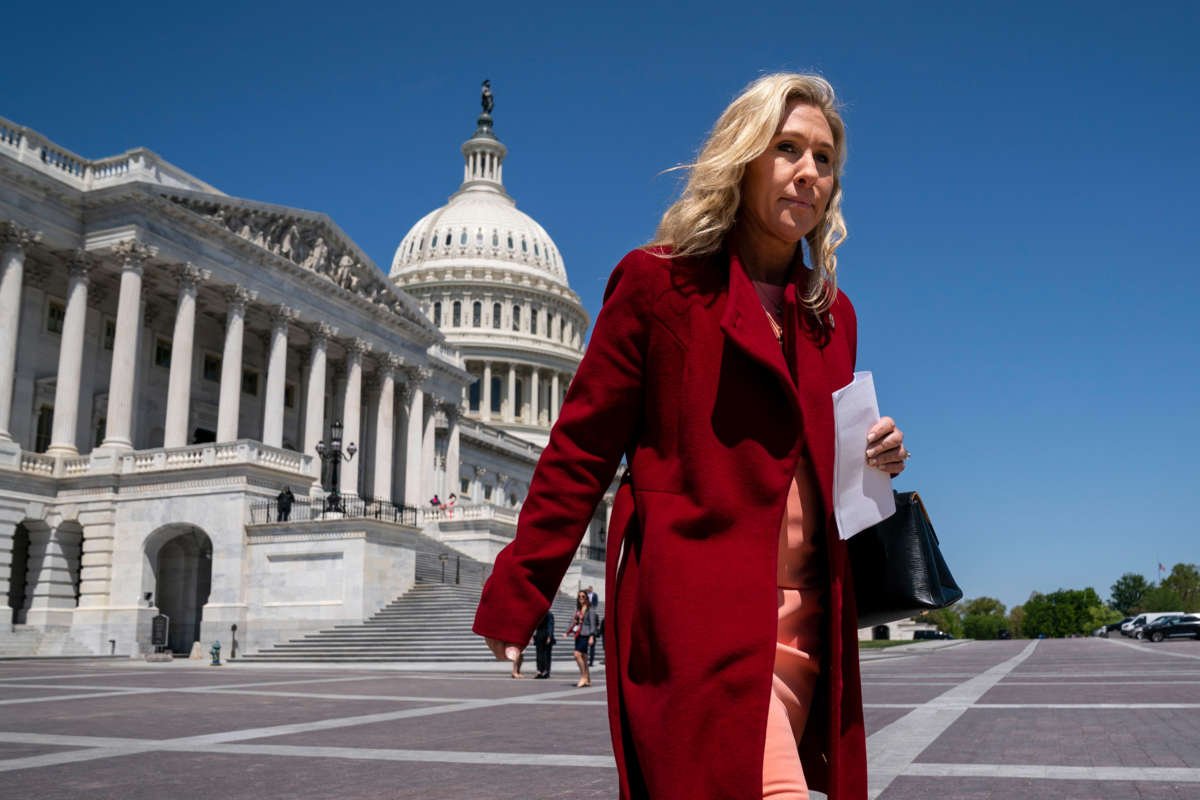Truthout is an indispensable resource for activists, movement leaders and workers everywhere. Please make this work possible with a quick donation.
A federal appeals court has overturned a lower court’s ruling regarding a challenge to Rep. Madison Cawthorn’s (R-North Carolina) candidacy, which could influence challenges against other candidates who have been accused of aiding an insurrection against the U.S. due to their attempts to keep former President Donald Trump in power.
A federal district judge previously ruled that Cawthorn’s eligibility to run for office couldn’t be challenged due to the Amnesty Act of 1872, which granted amnesty to former members of the Confederacy who had been barred from holding office due to conditions listed in the 14th Amendment to the Constitution. But that rationale was rejected on Tuesday in a ruling from a three-judge panel in the U.S. Court of Appeals for the Fourth Circuit.
“We hold only that the 1872 Amnesty Act does not categorically exempt all future rebels and insurrectionists from the political disabilities that otherwise would be created by Section 3 of the Fourteenth Amendment,” the opinion from the court, written by Judge Toby Heytens, said.
Although the court made it explicitly clear that it was not directly ruling on Cawthorn’s eligibility, leaving that to lower courts to decide upon, its decision does mean that the Amnesty Act cannot be used as a means of defense against such challenges. The appeals panel also ruled that the challenge to Cawthorn wasn’t moot, even though he lost in a primary election to another Republican candidate earlier this week.
The ruling is only legally binding in jurisdictions overseen by the Fourth Circuit Court, which include the states of Maryland, Virginia, West Virginia, North Carolina and South Carolina. But the ruling could still influence decisions in other courts where Republicans are facing 14th Amendment challenges.
Five voters in Georgia, for example, are challenging the candidacy of Rep. Marjorie Taylor Greene (R-Georgia), a Trump loyalist who pushed for his administration to consider using martial law in order to keep the former president in power following his loss to now-President Joe Biden.
Earlier this year, Georgia Administrative Law Judge Charles Beaudrot ruled against the challenge from the voters on Greene’s candidacy, improperly shifting the responsibility of proving whether Greene was eligible to run to the voters, despite Georgia precedent saying that the onus should lie on the candidate. Beaudrot also claimed that the challengers hadn’t presented enough evidence, and that therefore, he wasn’t obligated to make any decision regarding the 1872 law.
Those voters filed an appeal arguing that Beaudrot’s ruling rested on faulty logic, and that Greene’s advocacy for the use of martial law and her vote against the certification of the 2020 presidential election should render her ineligible.
“Greene’s defense rested almost entirely on her claimed lack of memory,” the appeal states, adding that Greene “answered ‘I don’t recall’ or some version thereof more than 80 times during the hearing.”
It’s possible that the Amnesty Act question could come about during the appeal in Greene’s case within the 11th Circuit Court system, which Georgia is a part of. The ruling in the Cawthorn case could be cited as a legal precedent in Greene’s case.
The Cawthorn decision could also impact other Trump-loyalist Republicans. Reps. Andy Biggs and Paul Gosar of Arizona are currently facing similar challenges based on 14th Amendment eligibility questions.
Holding Trump accountable for his illegal war on Iran
The devastating American and Israeli attacks have killed hundreds of Iranians, and the death toll continues to rise.
As independent media, what we do next matters a lot. It’s up to us to report the truth, demand accountability, and reckon with the consequences of U.S. militarism at this cataclysmic historical moment.
Trump may be an authoritarian, but he is not entirely invulnerable, nor are the elected officials who have given him pass after pass. We cannot let him believe for a second longer that he can get away with something this wildly illegal or recklessly dangerous without accountability.
We ask for your support as we carry out our media resistance to unchecked militarism. Please make a tax-deductible one-time or monthly donation to Truthout.
